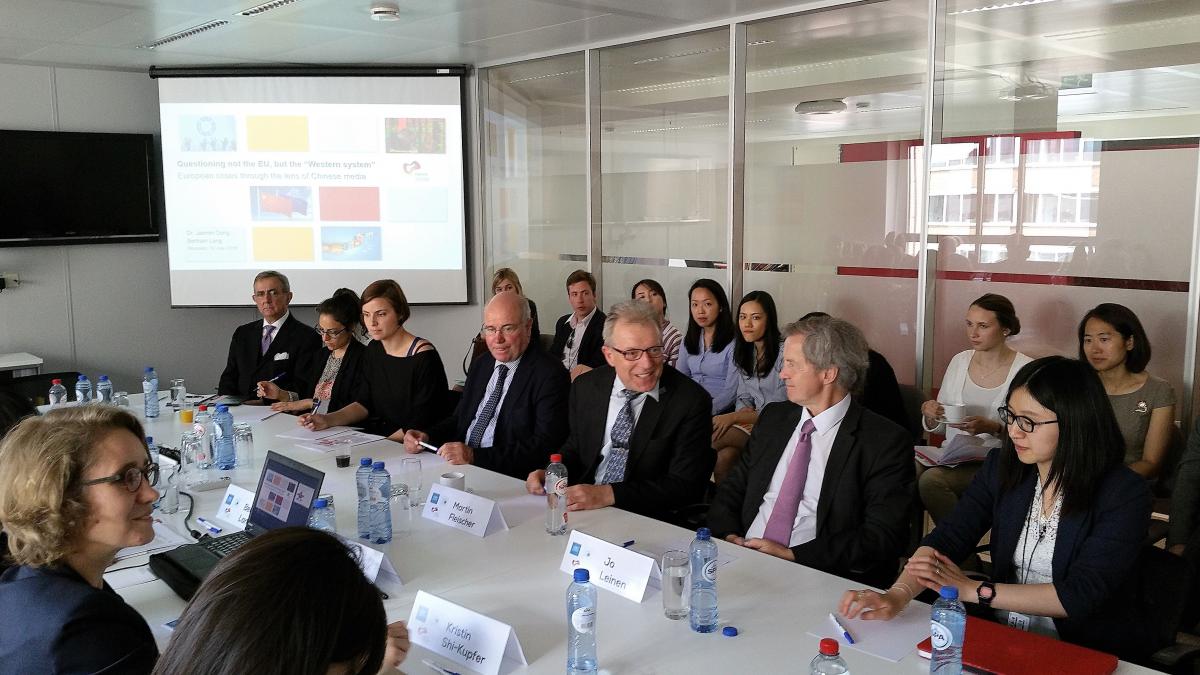The EastWest Institute, in cooperation with the Mercator Institute for China Studies (MERICS) and the European Parliament, jointly hosted an event entitled “How China Views Europe’s Crises: From Social Media to Official Propaganda” on July 12.
By Claudia Wessling, Media Relations Officer/Science Editor, MERICS
MERICS, a Berlin-based institute for contemporary and practical research on China, presented their latest study on how the Chinese media view the European crises. EWI’s Vice President for Regional Security, Ambassador Martin Fleischer, gave welcoming remarks to the audience and introduced the EastWest Institute as one of the oldest NGOs working in the areas of peace and security, with a unique U.S.-China program focusing on military-to-military as well as party-to-party dialogue (see here for more information).
Looking at a wide range of different Chinese media, the MERICS study explores how the heated debate around the Brexit, Europe’s sovereign debt crisis, the refugee crisis and the rise of right-wing populism are seen by Chinese media. The research revealed that official Chinese media use events in Europe to discredit Western concepts of democracy while more market-oriented outlets offered a more differentiated assessment.
In his keynote speech following Ambassador Fleischer’s introductory remarks, Jo Leinen, Head of the European Parliament’s Delegation for Relations with the People’s Republic of China, pointed out that "the story of the EU and China is one of curiosity and fear." With China being the 2nd biggest trade partner of the EU, there was a huge need "to learn more about that country," Mr. Leinen stressed. "Relations have reached a critical point," he added with regard to the increasingly heated discussions among member states on whether or not China should be given the status of a market economy and whether or not the surge of Chinese investments in Europe is a blessing or a curse.
"How China views the EU should matter to us," said Dr. Kristin Shi-Kupfer, Director of the Research Area Politics, Society, and Media at MERICS. Her comment echoed Mr. Leinen’s introductory remarks.
For their survey, the co-authors Dr. Jasmin Gong, Mr. Bertram Lang and Dr. Shi-Kupfer used software tools to search for a set of keywords relating to EU crisis events in around 75,000 articles of party-state and market-oriented media as well as in social media forums, and they subjected 300 commentaries and op-eds to further in-depth scrutiny. The result was a mixed picture, as Dr. Gong pointed out: "The Greek debt crisis and the Brexit referendum are discussed quite neutrally in Chinese media, and many reports reflect confidence in the EU’s stability. But after the Brexit vote actually happened, this confidence was disrupted."

Commentators of the official media question not the EU, but the “Western system”
The analysis, published within the framework of the MERICS China Monitor series, highlights a number of trends. Roughly one-third of all analyzed opinion articles (34%) portrayed the above-mentioned events as challenges to EU unity. Many Chinese commentators viewed the influx of refugees and the terrorist threat as crises the EU will eventually be unable to manage (38% and 34%, respectively). "The refugee crisis is the result of a self-righteous idea of democracy" or "China could be the ‘man of wisdom' for the establishment of a new world order” were some of the quotes that raised eyebrows among the representatives from EU institutions and think-tanks in the audience.
The study’s most striking finding was the difference between party-state media and more market-oriented outlets when it came to assessing events in Europe. Commercial media like Caixin or blogs like Sohu tried to give more differentiated accounts and took a closer look at internal European debates. Party-state media, on the other hand, clearly used coverage on crisis phenomena to discredit "the West" and its values. People's Daily or Xinhua described the EU and Europe as being "in a state of decay, like the West as a whole," as Mr. Lang pointed out. He added that some official commentators even went one step further and took "the moral high ground to promote Chinese concepts of authoritarian rule as an alternative to Western ones."
How the EU’s image is shattered by the European crises
The researchers stressed the need for a deeper analysis: "China’s domestic media discourse is a better early indicator of potential changes in attitudes towards Europe than diplomatic statements," Bertram Lang said. Hence, the following question arises: Is the EU's image in China already in shambles? Maybe not yet: After all, two thirds of the coverage analyzed by MERICS still reveal a rather neutral take on the EU's ability to confront its challenges. But should Chinese media increasingly question the EU as a haven of political stability, Europe's standing vis-à-vis China as an ever-more powerful player might be compromised.
"The development has to worry us, there might be danger for democratic systems," MEP Jo Leinen said in his closing remarks. In contrast, Dr. Shi-Kupfer from MERICS offered some reassuring advice for policymakers in EU member states. Dr. Gong recommended targeting China's market-oriented media and popular bloggers to convey a more positive, realistic image of the situation, stating “Mind you, some Chinese bloggers have 40 million and more followers. That makes for quite a bit of influence!"
To access the complete MERICS study, please follow this link.
To see the website of MERICS, please follow this link.

